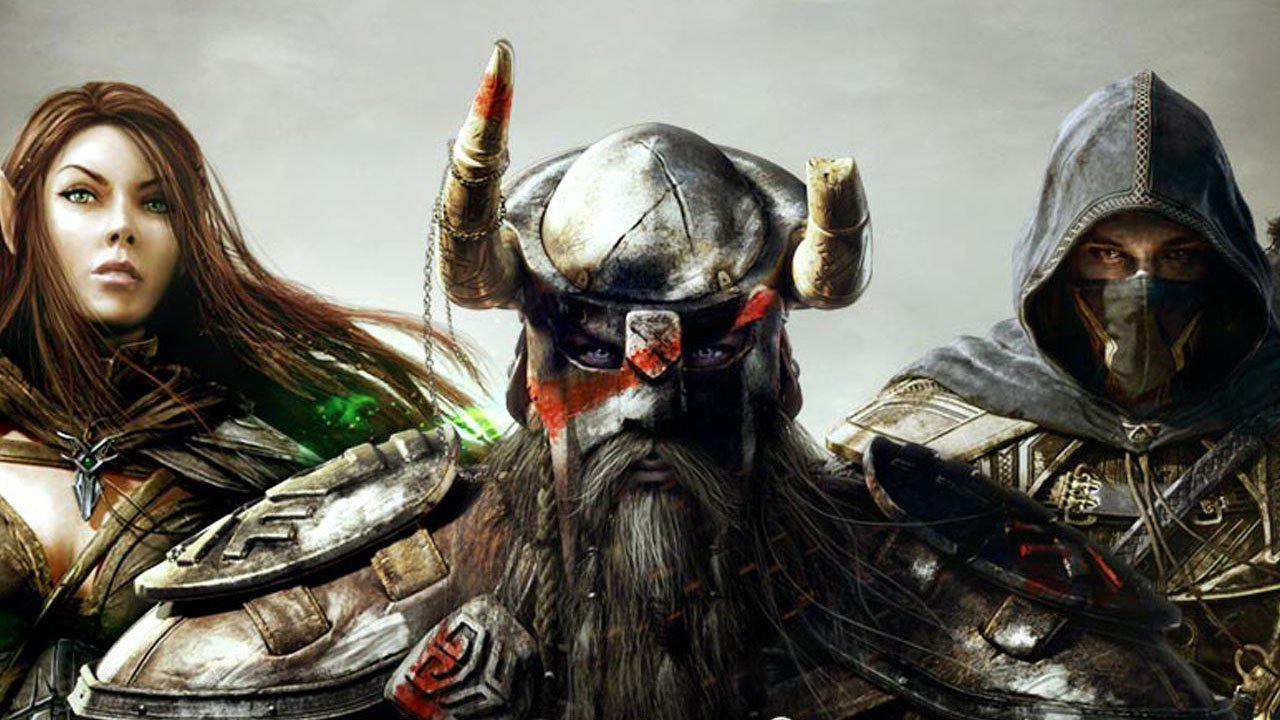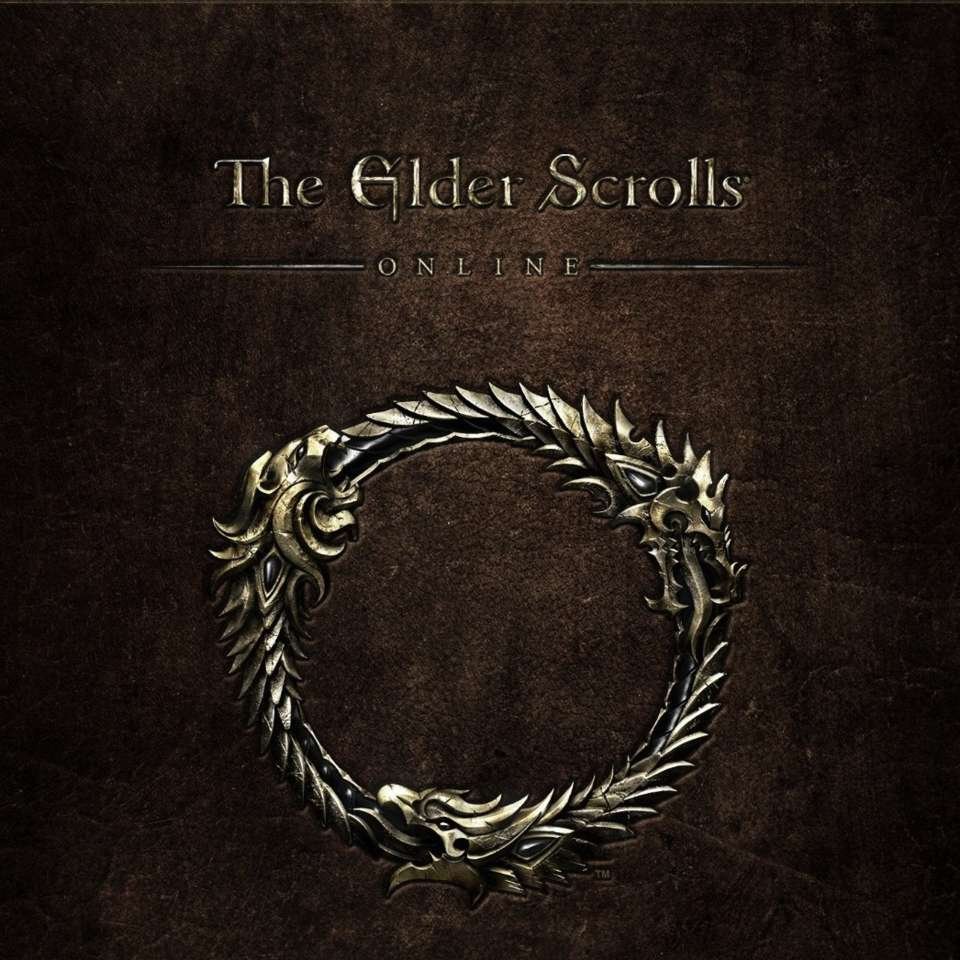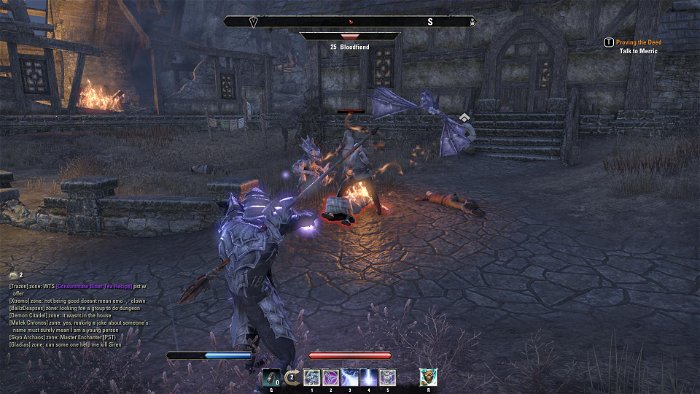MMOs challenge the review process. They’re long, multi-feature games that take longer than the week (at most) that we often have to review a game without learning how to power-level. For a lot of MMO reviews, I’m required to finish the review before reaching the endgame content.
Even assuming I had extra time with Elder Scrolls Online, the authorization issue turned me off. For those of you unaware, those who purchased the game early were able to access the game for a few days to try it out. However, once the release day hit, the game immediately stopped working – until you set up recurring subscription rates, despite 30 days of free game-time. While one was able to cancel beforehand.
How does this influence my review? Well, for one thing, MMORPGs with subscription rates rely on cultivating goodwill and appeal to the players. If you’re paying to play a game at a monthly rate, in addition to the initial fee, you’re expecting far greater than you would be otherwise. And while this game is not without its merits, it doesn’t quite live up to what I’d expect for a subscription game.
I will say, as a starting point, that there’s a concerted effort to make this game feel like an Elder Scrolls game. Exploration is an option, and finding books for the Mages Guild, or small mini-dungeons to look for extra experience, is similar to the single-player games. The first person perspective, the door transitions, and even the dialogue all attempt to evoke something similar to Oblivion or Skyrim. Of course, you start in prison. All of these are recognizable conventions that Elder Scrolls has used many times.
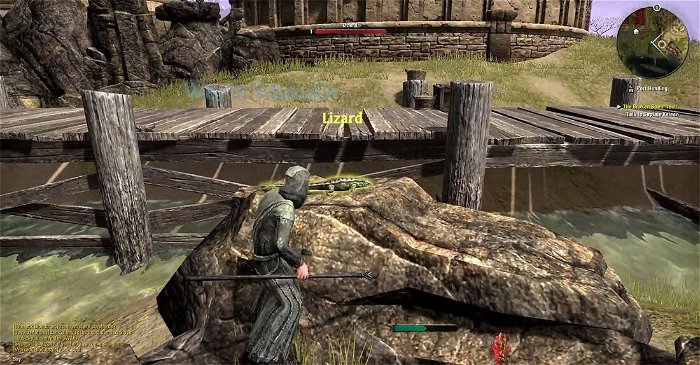
In practice, though, the standard online MMO structure holds the Elder Scrolls experience back. Areas follow a level progression, and curtail the full open-world exploration we’ve come to expect from an Elder Scrolls game. The mini-dungeons are extremely repetitive, almost identical in their layout (long way around with enemies, boss, quest item to take somewhere, shortcut door out to the entrance). What’s worse, they’re shared with other players, meaning that you often move through areas cleared by someone just ahead of you, to find the boss encounter vacant save for a dozen players standing around, axes ready to chop and loot.
In fact, the shared areas presented issues even in the open world, with enemies cleared out. While everyone who hits an enemy once gets credit for it, respawn rates coupled with the area size means that someone is always waiting. It happened more often than I’d like – the game’s dedication to having a server per region means everyone loads into one world, and that tends to cause crowding. Since they obviously have “normal” instances with players seeing different content depending on how far they’ve progressed, I’m not sure they couldn’t have implemented a system to avoid dumping everyone into one.
The skill system is intriguing in how its limitations to the Elder Scrolls philosophy are implemented. Skills go up by using them, and anyone can use anything – but the game provides four ‘classes’ which grant specific abilities exclusive to that class. These are all pretty distinct and engaging – Sorcerer, my chosen class, left the standard fire/ice/lightning layout of magic in favour of crystalline Dark Magic, or the ever-popular Daedra summoning. I tended to heavily favour class skills, even over the staff-based skills that granted more conventional magic or racial skills, and I quickly felt somewhat unfulfilled by the skills and their utility. There are only five skill slots available, not including an ‘ultimate’ skill slot and an item slot, and each skill levels individually to advance into greater iterations – meaning that many skills must be left behind as the game goes on. Given that re-speccing your spent skill points, used to unlock these critical skills, is expensive and requires you refund ALL skill points (cost is calculated per point you have), you are often stuck with what you have, and must agonize over whether something is worth taking. I felt that skills were inconsistent in their levelling speed, leading to a bit of grind to level up – that is, when I wasn’t far too high level for the areas I was in.
There’s content to explore, surely – though the tutorial islands, at least in my geographical start-point, Daggerfall felt rather sparse and empty. Later areas feel more populated, but you quickly surpass the content’s level just by playing it, finding yourself higher than anything else. You can still die, of course, but I found myself wanting to push on past content to move on to something about my level – which I often did, due to the number of bugs. Some quests were outright broken, with events not triggering. The main quest itself even bugged out.
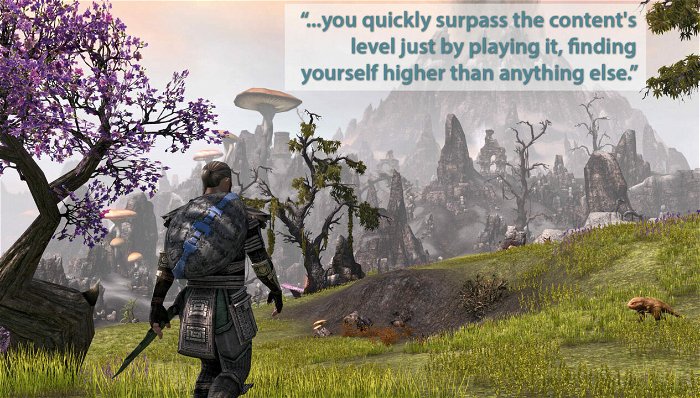
The plot of Elder Scrolls Online is a bit of a sticking point with me, however, because of its striking similarity with that of Oblivion, the fourth game in the series. Molag Bal’s plan to use the loss of the Dragonblood line of Emperors to invade Tamriel sounds painfully familiar – mostly because it’s the exact same plot Mehrunes Dagon concocted in Oblivion. The writing isn’t terrible, and there’s plenty of universe lore applied, but you can’t escape the idea that you’ve done this all before. Even Sheogorath feels like he’s in a rut, and this being a prequel makes it more noticeable for the fact that all the things that this feels like haven’t happened yet.
Overall, I found myself feeling like I was retreading more of the same. The plot, and the gameplay, both feel like they were taken out of a previous game, either an Elder Scrolls title or an old MMO. We’re coming to the point where the old World of Warcraft-style online games aren’t as relevant, and paying monthly for a game is a waste when other companies are offering the same or better experiences for just the initial purchase, or free-to-play. I could have fun with this, but it doesn’t hold attention, and many of the design decisions deter you from pushing onto the end-game content. It’s fine if that’s all you care about, but the progression and exploration has to be engaging, because many players aren’t interested in power-leveling.
I can’t really recommend this beyond its initial 30 days. It’s a good effort, but there are stronger online experiences out there.
